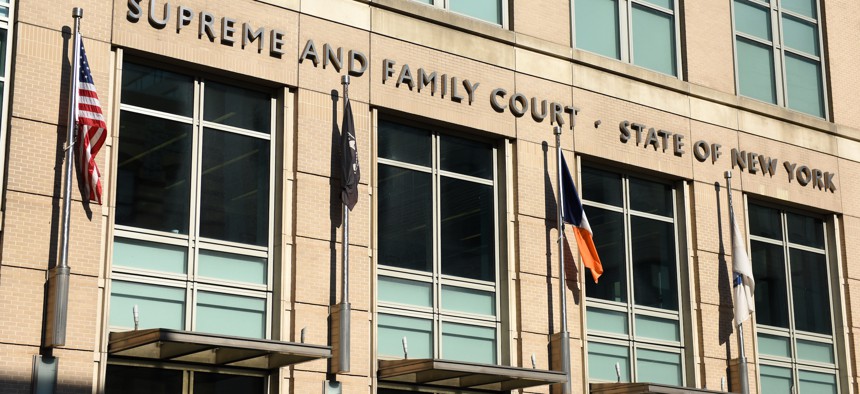Video hearings add to frustration and challenges in NYC family courts for families of color
Advocates argue a host of problems for parents are keeping them from being reunified with their children.

Family court Bumble Dee/Shutterstock
Like many New York City agencies, family court shut its doors and moved all proceedings online when COVID-19 hit. Once that happened, Administration for Children’s Services (ACS) emergency hearings to remove children from their homes were prioritized in the court system, ahead of emergency hearings requested on behalf of parents and children. This added to already existing challenges for Black and brown families.
Going into the pandemic, family separation had already been occurring twice as much in the Bronx compared to any other borough in New York City, according to Bronx Defenders. Additionally, Black children were 13.6 times more likely to be put into foster care. Now with a priority on ACS emergency hearings, reunification rates by ACS in New York City dropped more than 20% in 2020, as compared to 2019.
Moving hearings online also made it difficult for families hoping to be reunited with their children to make it to their scheduled hearings, because of limited access to technology.
“For the many people that we serve, access to basic telecommunications devices like a phone, laptop, data plan, or Wi-Fi network used in virtual court also poses an enormous barrier,” Emma Ketteringham, Managing Director of Family Defense Practice at Bronx Defenders told NYN Media. “In many cases, we have seen judges admonishing parents for being in noisy public spaces where they could access free Wi-Fi, or refusing to recall a case so that parents could recharge their phones.”
In addition to poor accessibility, parents also have had little to no contact with their attorneys due to the overwhelming amount of clients family court attorneys have on a daily basis. Online hearings also have made it challenging to refer parents to services that would help them regain their children.
“Prior to COVID, it took a very long period of time for parents to be referred to services that are court-required to regain custody of their children.” Joyce McMillan, executive director at JMacForFamilies said. “During COVID the process slowed to an almost standstill as agencies that already operated dysfunctionally scrambled to move the very few available mandated classes to an online platform.“
COVID-19 also has interrupted valuable in-person visits parents had with their children.
“During COVID, families could only see their children, including newborns, online. Parents and children could not hold, hug, smell or touch one another. Visits before COVID were inadequate, the vast majority of families were granted 2 hours in person once a week, which equates to only 4 days a year,” McMillan said. “But after COVID, besides missing the very important physical component of visits, the time spent visiting decreased as some families lacked stable internet service and small children were unable to focus on screen without distraction for more than a few minutes.”
A spokes person for the New York City Office of Court Administration declined to comment.
Family advocates argue that in order for things to change, courts must provide the technology that parents need to successfully attend their court hearings.
“For family courts to work more fairly, they must operate with impacted families in mind. It can look like prioritizing the family's schedule for court appearances and their preference for remote or in-person hearings,” said Ketteringham.
“When appearances have to be conducted virtually, the court must provide the technology and technical assistance necessary for families to join the hearings. It's critical that we end ACS' family separation practices that create generational trauma in Black and brown families -- and move toward a care model that invests in the wellbeing of parents, children, and their communities,” she added.
Family advocates also argue that families must be advised of their rights, since in most cases full investigations happen before the person being probed is provided a legal support person, explained McMillan.
Advocates are pushing for the Family Miranda Rights bill, which requires child protective services to disclose parents’ and caretakers’ rights. They are also advocating for the Informed Consent bill, which prohibits drug or alcohol testing and screening of pregnant women.
These bills are what advocates hope will help dismantle the disproportionate representation of Black and brown children and allow families to reunite.
